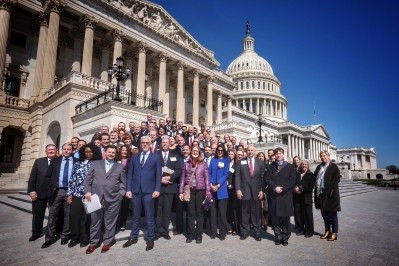Continued vigilance needed on sales restriction attempt, NPA chief says

A bill introduced by State Senator Kay Khan, D-Newton, seeks to prevent minors from purchasing “over-the-counter diet pills or dietary supplements for weight loss or muscle building.” The bill defines these as products that, “May include, but are not limited to, thermogens, which are substances that produce heat in the body and promote more calorie burning, lipotropics, which are compounds that help break down fat during body metabolism, hormones, including hormone modulators and hormone mimetics, appetite suppressants, or ingredients deemed adulterated under 21 U.S.C.A § 342.”
Improper restriction of legal products
Dan Fabricant, PhD, president and CEO NPA testified last week against the bill. He said the bill is an updated version of one that Khan has introduced before.
“She’s been on our radar for about two weeks,” Fabricant told NutraIngredients-USA. “She tried to make improvements that weren’t really improvements. She mentioned things like thermogenics, I think without really understanding these ingredients and what they do in the body. Caffeine is a thermogenic. Are we going to place caffeine-containing products behind the counter?”
Khan, who is a psychiatric nurse by training, was motivated to introduce the legislation because of the damage she has seen eating disorders cause. Judging by the tenor of her legislation, Khan believes that dietary supplements play a role in the negative spiral experienced by those suffering from anorexia or bulimia. Fabricant that it’s important to recognize that dietary supplements are legal products and are regulated as a subcategory of foods, with no proven link to the disorders Khan is concerned about. Yet other products, with clearly advertised risks, are freely available.
“We’ve never had a food product behind the counter. It’s unprecedented,” he said. “Kids can buy aspirin or Tylenol over the counter, and that’s the leading cause of liver failure.”
Psychology, not product choice, drives disorders
Fabricant said he also doubts that a ban of any sort will achieve what Khan is looking for. Eating disorders and body dysmorphic disorders are multifactorial issues. Just taking one factor out of the equation (and Fabricant and others dispute that it is even a valid factor in the first place) is unlikely to provide the magic bullet. Unlike certain drugs that have been placed on controlled substances lists, there is no proven risk of addiction for dietary supplement ingredients.
“We know from experience and from research on these disorders that there is a huge psychological component. Recovery is a lifelong process. If all of a sudden we place a ban on a category of products, can we expect those people will suddenly develop better habits? It’s a knee jerk reaction to somehow blame this on supplements,” he said.
In addition to the weak scientific backing of the bill, Fabricant said it also has structural inconsistencies. As it stands, placing a product ‘behind the counter’ doesn’t take into account the structure of the modern marketplace.
“How would you regulate the Internet component of this? Effectively you are only going to regulate the brick and mortar outlets, and put them at a disadvantage,” he said.
Fabricant said that NPA will continue to monitor the progress of the bill, which seems unlikely to advance at the moment. But given her past history, it seems that Khan is committed to the idea.
“We are going to continue meeting with the leadership of the committee—with Kay Hogan, who is the chairwoman. She has been very receptive. We are always happy to work on eduction,” he said.
Positive industry contributions
In a press release, NPA also noted the big contribution that the dietary supplement industry makes to the local and national economy. According to NPA the supplement industry supports more than 720,000 jobs, nearly $40 billion in wages, contributes over $100 billion annually to the national economy, and raises $15 billion in tax revenue for the federal government. In Massachusetts alone, the dietary supplement industry contributes nearly $300 million annually to the national economy, and supplies 4,500 jobs. In then end, it generates annually over $150 million in Massachusetts wages, $70 million in federal taxes, greater than $50 million in state taxes, and nearly $35 million to fund state and local schools, roadways, and other construction projects.









